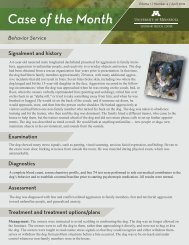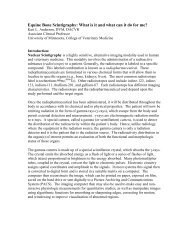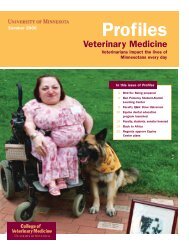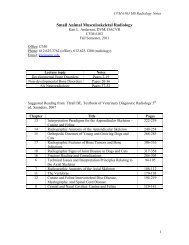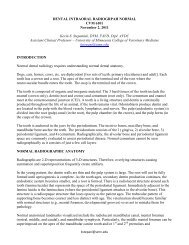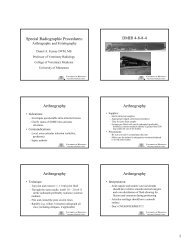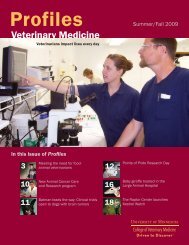Summer/Fall 2013 PDF - University of Minnesota College of ...
Summer/Fall 2013 PDF - University of Minnesota College of ...
Summer/Fall 2013 PDF - University of Minnesota College of ...
You also want an ePaper? Increase the reach of your titles
YUMPU automatically turns print PDFs into web optimized ePapers that Google loves.
COMMUNITY SERVICE<br />
“Our goal is to improve each day, become<br />
more efficient,” says Parks, president <strong>of</strong><br />
SIRVS.<br />
All told, SIRVS has done more than 1,000<br />
wellness exams and 250 spay and neuter<br />
surgeries.<br />
“SIRVS gives us the opportunity to make<br />
a difference in the lives <strong>of</strong> a community<br />
and its animals while providing a novel<br />
educational experience to our veterinary<br />
students,” says faculty adviser Dr. Larissa<br />
Minicucci, veterinary public health<br />
program director. “Seeing the active<br />
learning and witnessing improved animal<br />
health is very inspiring.”<br />
In addition to students, faculty, staff,<br />
and alumni, SIRVS is supported by<br />
organizations like Banfield Charitable<br />
Trust, which awarded the group a pet<br />
advocacy grant in 2012. Minicucci and<br />
the students are also able to share their<br />
experience with others in the pr<strong>of</strong>ession.<br />
The <strong>2013</strong> <strong>Minnesota</strong> Veterinary Medical<br />
Association Annual Meeting included a<br />
presentation about SIRVS.<br />
Through SIRVS, students get experience<br />
doing what they have been studying in<br />
school and learn practical skills that aren’t<br />
always part <strong>of</strong> the veterinary curriculum,<br />
like completing paperwork. A lot <strong>of</strong><br />
clinical skills are used for the first time,<br />
and a lot <strong>of</strong> protocols are implemented<br />
for the first time for many team members,<br />
who quickly learn to think on their feet.<br />
Students can assist with surgeries one day<br />
and the next day do anesthesia, wellness<br />
exams, or post-surgical recovery.<br />
“I learned so much in four days,” says<br />
Parks. “To get actual hands-on experience<br />
with what we learned in class was<br />
incredibly valuable.”<br />
Reaching out with<br />
VeTouch<br />
Veterinary students care for<br />
clients’ pets at monthly VeTouch<br />
clinics at Hennepin Avenue<br />
United Methodist Church.<br />
If any program embraces the concept<br />
<strong>of</strong> “it takes a village,” it’s VeTouch<br />
(Veterinary Treatment Outreach for<br />
Urban Community Health), a student-run<br />
nonpr<strong>of</strong>it organization that provides basic<br />
veterinary care for the pets <strong>of</strong> low-income<br />
residents <strong>of</strong> the Twin Cities.<br />
Dr. Vicki Wilke, a former assistant<br />
pr<strong>of</strong>essor in the Veterinary Clinical<br />
Sciences Department, teamed up with<br />
Kelly Noyes, a veterinary technician,<br />
to establish the group in 2008. Kristy<br />
Lashbaugh, e-learning associate, thought<br />
up the name for the group, and VeTouch<br />
treasurer Nikko Poulos designed a logo.<br />
Some 94 students are involved—almost<br />
a third <strong>of</strong> the preclinical veterinary<br />
student body—and their membership fees<br />
help support VeTouch’s efforts. Faculty<br />
members also donate their time and<br />
veterinary services, as do a host <strong>of</strong> other<br />
veterinarians, veterinary technicians, and<br />
pre-vet students.<br />
The community is engaged, too: Hennepin<br />
Avenue United Methodist Church<br />
provides the space for monthly VeTouch<br />
clinics, and members <strong>of</strong> its congregation<br />
donate funds and supplies. The<br />
<strong>Minnesota</strong> Veterinary<br />
Medical Foundation<br />
contributes financial<br />
support, Hill’s Pet<br />
Nutrition donates food,<br />
Boehringer Ingelheim<br />
Vetmedica provides<br />
vaccines, IDEXX<br />
Laboratories donates<br />
feline leukemia virus/<br />
feline immunodeficiency<br />
virus tests, and Novartis<br />
contributes heartworm<br />
tests and flea and<br />
heartworm medicine.<br />
A VeTouch clinic is<br />
<strong>of</strong>fered on the first<br />
Sunday <strong>of</strong> every month,<br />
when Hennepin Ave<br />
United Methodist Church<br />
hosts a meal for lowincome<br />
residents <strong>of</strong> the<br />
community. VeTouch<br />
coordinates with this<br />
event to provide care to the pets <strong>of</strong> those<br />
attending the meal. The clinic <strong>of</strong>ficially<br />
opens at 3 p.m., but clients <strong>of</strong>ten start<br />
waiting in line at 11 a.m., filling the chairs<br />
lining the hallway outside the exam rooms<br />
in the church basement.<br />
Working at each VeTouch clinic is<br />
a bustling team <strong>of</strong> 10-15 veterinary<br />
students, three to five veterinarians, three<br />
to five veterinary technician students and<br />
their veterinary supervisor from Globe<br />
(continued on next page)<br />
Pr<strong>of</strong>iles <strong>Summer</strong>/<strong>Fall</strong> <strong>2013</strong> 11



